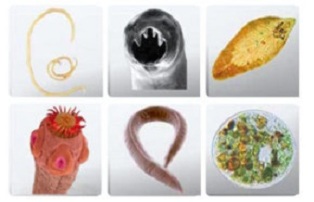Often, various types of parasites are mistaken for stress or vitamin deficiencies. Where and what analysis should be performed to identify infection?
Tests for parasites - how and what to do - this question arises when the health condition worsens for no reason.
Different types of parasites that are ideally adapted to the human body cannot manifest themselves for a long time. Typically, children attending school or kindergarten are tested for helminths from time to time. However, parasite infections are also very common in adults.
Some symptoms of helminthic heat, for example:
- decrease in hemoglobin in the blood;
- poor appetite;
- sleep disorder;
- weight loss;
- increasing body temperature.
There are similarities with different types of pathological conditions.
The probability of infection is very high. Many people who are not aware of this are carriers of one form or another. In addition, damage to human health can be caused not only by worms, but also by some protozoa. Their presence in the human body causes toxoplasmosis and other dangerous diseases. It is clear that analysis for parasites in the human body must be performed in order to detect the infection in a timely manner and prescribe appropriate treatment as soon as possible. A local therapist will tell you what tests to take for parasites.
When to check for parasites in adults
Experts recommend testing for parasites if you have one or more symptoms on this list:
- Digestive system problems: constipation, diarrhea, nausea, vomiting, flatulence.
- Skin becomes pale due to lack of vitamins and nutrients.
- Rapid fatigue, energy loss, apathy are observed
- Body weight decreased rapidly.
- Allergic reactions occurred in the absence of obvious irritants (such a reaction is caused by worm waste products).
If the body's resistance to colds has deteriorated as a result of reduced immunity, it is recommended to perform tests (comprehensive analysis for parasites).
In addition, itching of the skin around the anus indicates the presence of a helminthic infestation (enterobiasis) that can be confirmed if tested for parasites.
What tests are generally performed to identify parasites in the human body?
If we suspect that we are infected with helminths or other parasites, we want to start treatment immediately. However, in order to prescribe the necessary medication, you must first check for the presence of parasites, because it is necessary to understand what species are located in the body. You can find out where to test for parasites by visiting the nearest clinic.
Fecal Analysis

The simplest and most common solution in this situation is a stool test where specialists will look for helminth eggs.
This type of analysis allows you to determine the presence of:
- roundworms;
- trematodes or flukes;
- ribbon worms.
However, this type of analysis has a significant drawback: the results of fecal analysis for parasites are not always reliable, because the parasites multiply at certain times and cannot lay eggs for a long time. Therefore, fecal analysis for parasites is repeated 2-3 times at intervals of several days for greater reliability.
Extended stool analysis
In addition to the standard stool analysis, there is a detailed analysis that is more reliable and accurate. This type of diagnostics, based on PCR technology, helps detect the DNA of a parasite, including dead or immobile. This method allows you to find out which worms are in the body, that is, the doctor can determine which drug is more effective in combating the disease.
Scratching for enterobiasis
Pinworms are one of the most common helminth species. To be tested for this type of parasite, you need to break the skin folds around the anus where you can find the eggs. The results of such a study should be repeated in a few days to increase the accuracy. This test is painless and suitable for both adults and children as a routine parasite test.
Blood test
If you perform an immunoenzymatic blood test, it is possible to establish a parasite infestation with high accuracy. If you go through this type of analysis, you can detect antibodies and antigens of almost all types of parasites. Antigens, in this case, are waste products of parasites and themselves, and antibodies are immunoglobulins synthesized in the human body to fight infection. Using this method, it is possible to diagnose the disease at an early stage, when there are not many parasites and it is easy to fight them.
For this analysis, you need to give blood from a vein. The result with a reliability of at least 95% will be known no later than 9 days. Of course, such studies are more appropriate for adults.
In addition to this method, some other blood test methods are used to identify parasites, especially in the form of acute helminthiasis. They are based on different examination methods that allow to diagnose different infections in children and adults with high accuracy.
Some medical facilities offer a comprehensive blood test to detect different types of helminths.
To prepare for the analysis, you need to do the following:
- that the last meal was 10 to 12 hours before the test;
- Eliminate fatty, smoked and salty foods from the diet the day before;
- 24 hours before the test, exclude smoking and alcohol consumption.



























